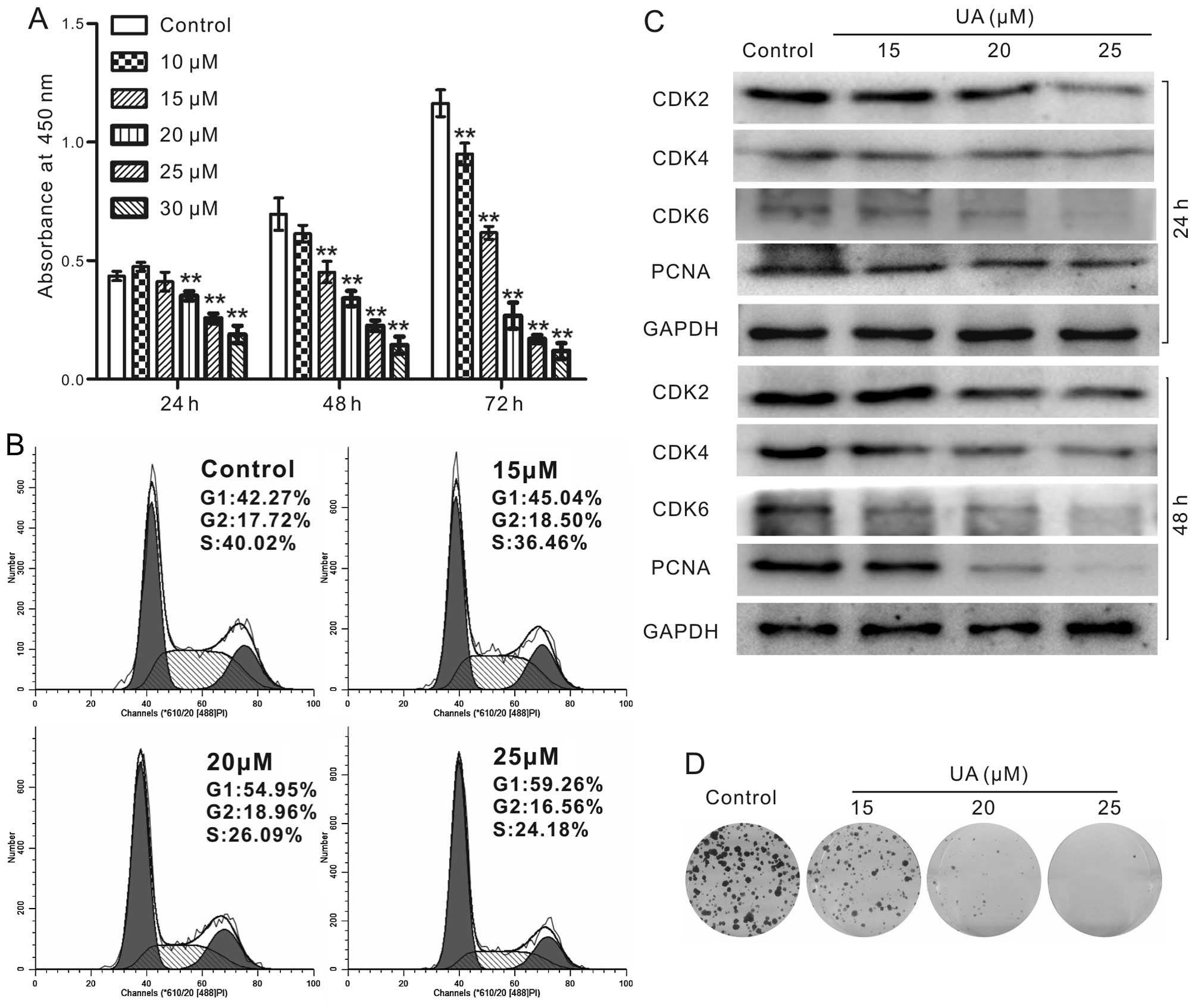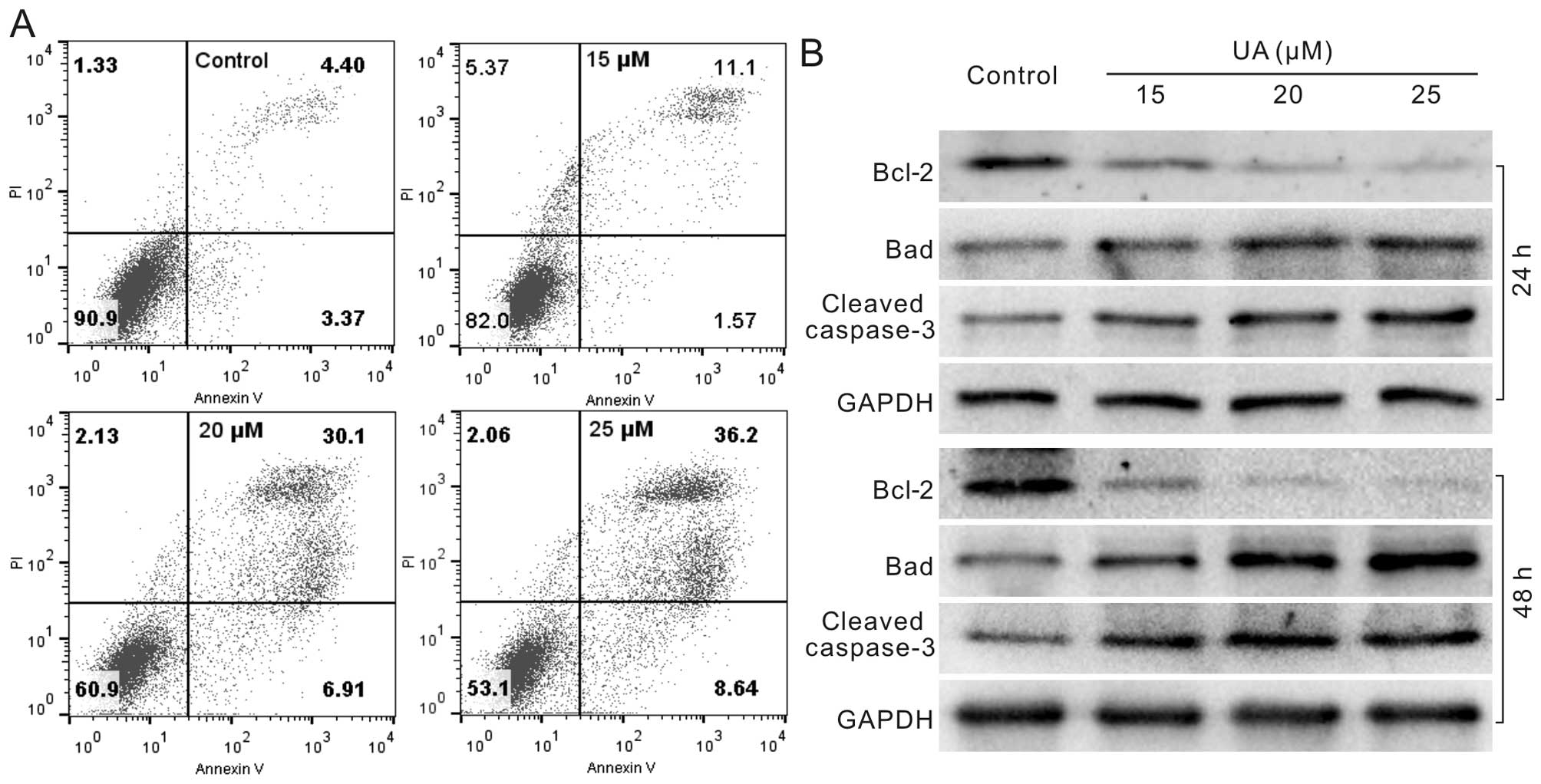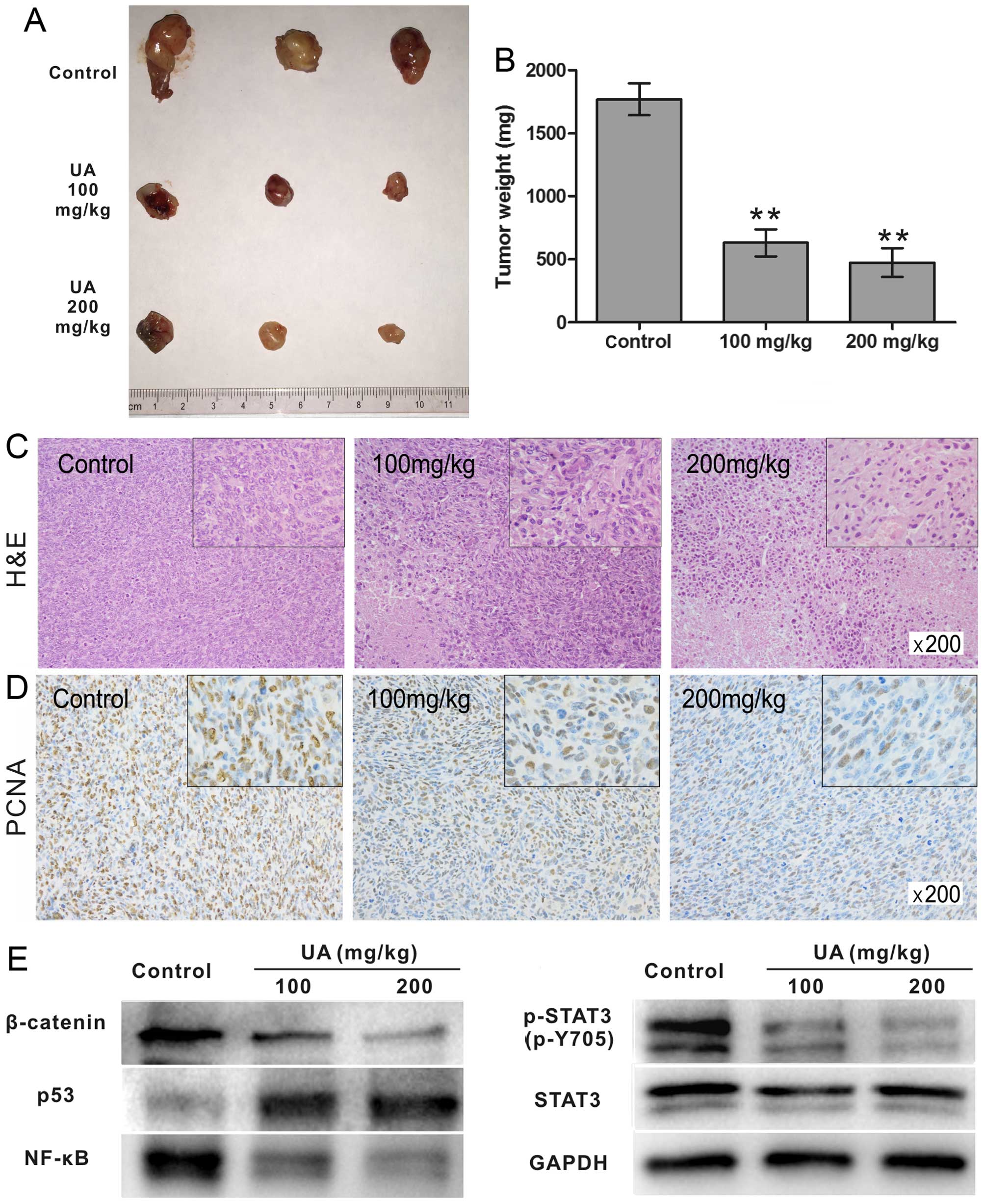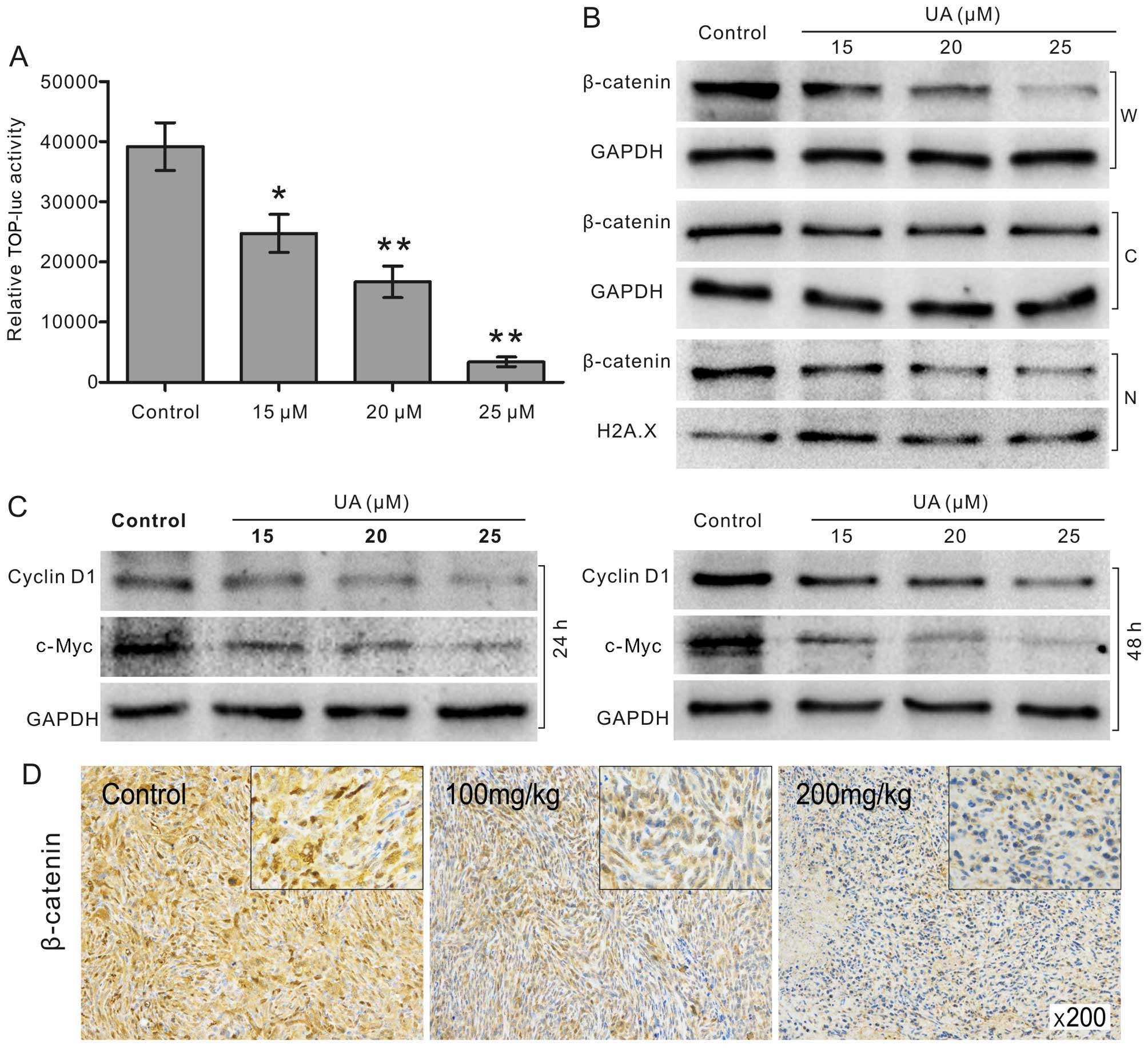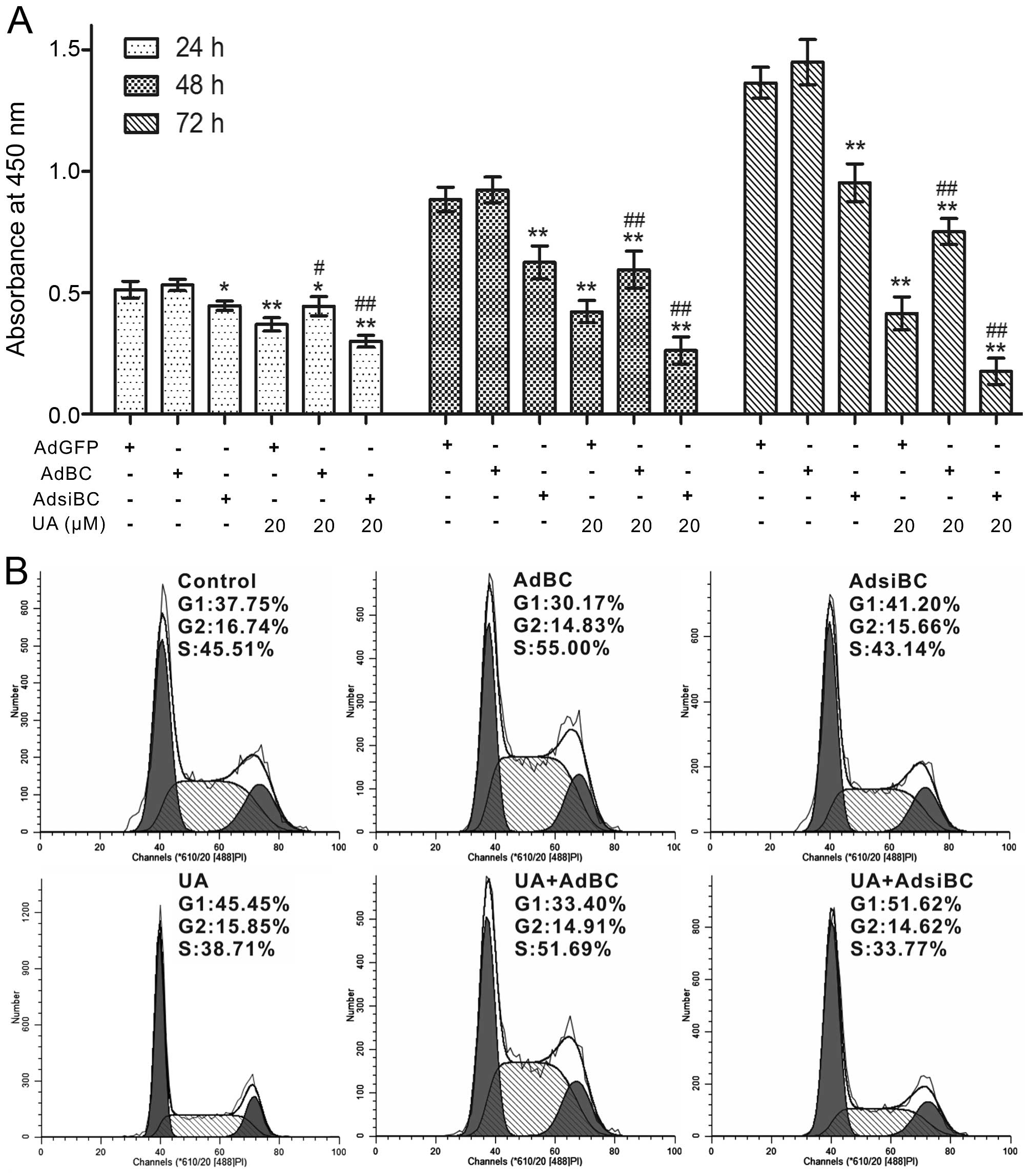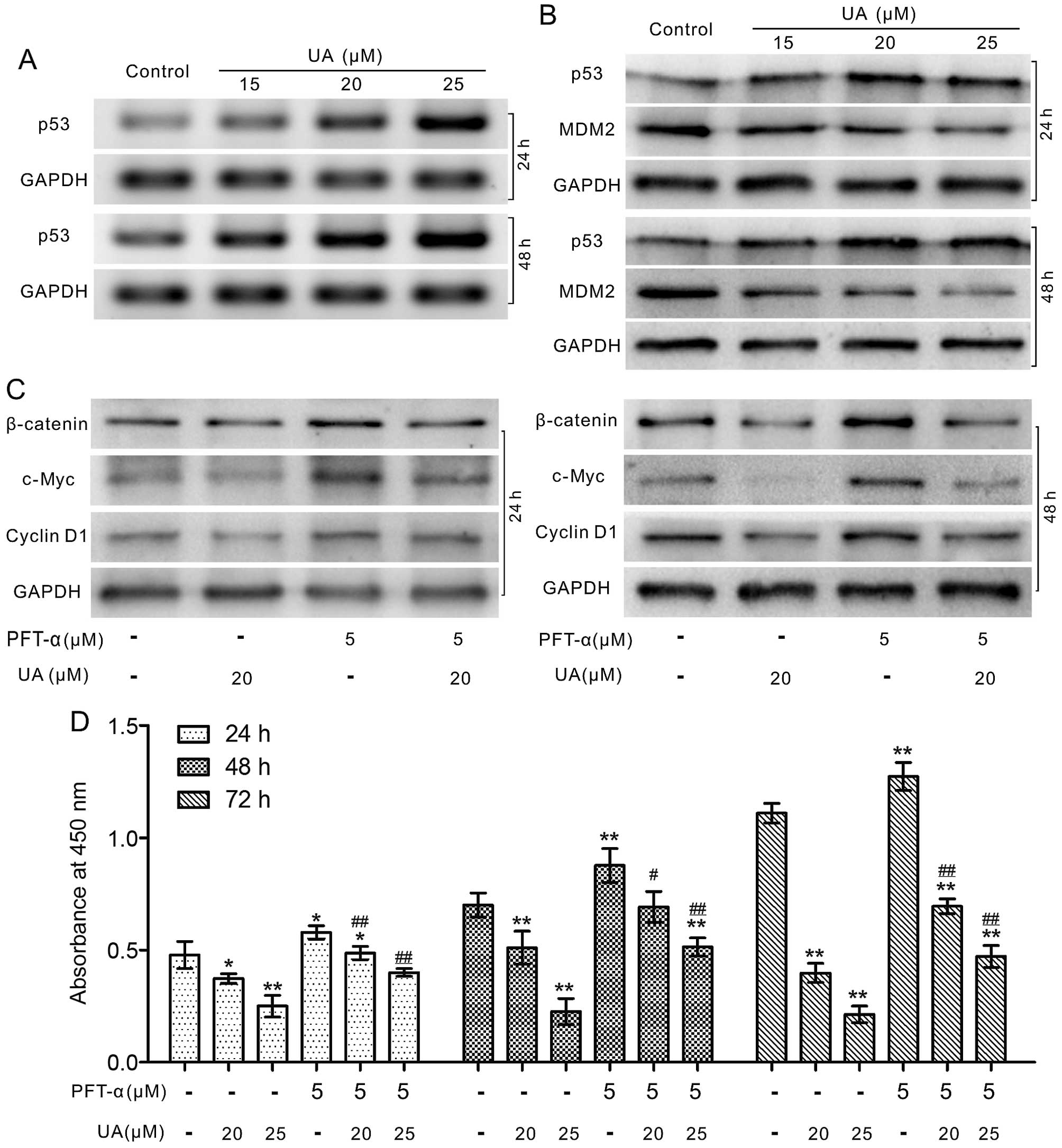|
1
|
Cheng S, Zhang X, Huang N, Qiu Q, Jin Y
and Jiang D: Down-regulation of S100A9 inhibits osteosarcoma cell
growth through inactivating MAPK and NF-κB signaling pathways. BMC
Cancer. 16:253. 2016. View Article : Google Scholar
|
|
2
|
Bielack SS, Kempf-Bielack B, Delling G,
Exner GU, Flege S, Helmke K, Kotz R, Salzer-Kuntschik M, Werner M,
Winkelmann W, et al: Prognostic factors in high-grade osteo-sarcoma
of the extremities or trunk: An analysis of 1,702 patients treated
on neoadjuvant cooperative osteosarcoma study group protocols. J
Clin Oncol. 20:776–790. 2002. View Article : Google Scholar : PubMed/NCBI
|
|
3
|
Kempf-Bielack B, Bielack SS, Jürgens H,
Branscheid D, Berdel WE, Exner GU, Göbel U, Helmke K, Jundt G,
Kabisch H, et al: Osteosarcoma relapse after combined modality
therapy: An analysis of unselected patients in the Cooperative
Osteosarcoma Study Group (COSS). J Clin Oncol. 23:559–568. 2005.
View Article : Google Scholar : PubMed/NCBI
|
|
4
|
Ando K, Heymann M-F, Stresing V, Mori K,
Rédini F and Heymann D: Current therapeutic strategies and novel
approaches in osteosarcoma. Cancers (Basel). 5:591–616. 2013.
View Article : Google Scholar
|
|
5
|
Chou AJ and Gorlick R: Chemotherapy
resistance in osteosarcoma: Current challenges and future
directions. Expert Rev Anticancer Ther. 6:1075–1085. 2006.
View Article : Google Scholar : PubMed/NCBI
|
|
6
|
Prasad S, Yadav VR, Sung B, Gupta SC,
Tyagi AK and Aggarwal BB: Ursolic acid inhibits the growth of human
pancreatic cancer and enhances the antitumor potential of
gemcitabine in an orthotopic mouse model through suppression of the
inflammatory microenvironment. Oncotarget. 7:13182–13196.
2016.PubMed/NCBI
|
|
7
|
Pu F, Chen F, Lin S, Chen S, Zhang Z, Wang
B and Shao Z: The synergistic anticancer effect of cisplatin
combined with Oldenlandia diffusa in osteosarcoma MG-63 cell line
in vitro. Onco Targets Ther. 9:255–263. 2016.PubMed/NCBI
|
|
8
|
Chen S, Wang Z, Huang Y, O'Barr SA, Wong
RA, Yeung S and Chow MSS: Ginseng and anticancer drug combination
to improve cancer chemotherapy: A critical review. Evid Based
Complement Alternat Med. 2014:1689402014.PubMed/NCBI
|
|
9
|
Zhang Y, Kong C, Zeng Y, Wang L, Li Z,
Wang H, Xu C and Sun Y: Ursolic acid induces PC-3 cell apoptosis
via activation of JNK and inhibition of Akt pathways in vitro. Mol
Carcinog. 49:374–385. 2010.PubMed/NCBI
|
|
10
|
Huang CY, Lin CY, Tsai CW and Yin MC:
Inhibition of cell proliferation, invasion and migration by ursolic
acid in human lung cancer cell lines. Toxicol In Vitro.
25:1274–1280. 2011. View Article : Google Scholar : PubMed/NCBI
|
|
11
|
Shanmugam MK, Ong TH, Kumar AP, Lun CK, Ho
PC, Wong PTH, Hui KM and Sethi G: Ursolic acid inhibits the
initiation, progression of prostate cancer and prolongs the
survival of TRAMP mice by modulating pro-inflammatory pathways.
PLoS One. 7:e324762012. View Article : Google Scholar : PubMed/NCBI
|
|
12
|
Deng L, Zhang R, Tang F, Li C, Xing Y-Y
and Xi T: Ursolic acid induces U937 cells differentiation by
PI3K/Akt pathway activation. Chin J Nat Med. 12:15–19.
2014.PubMed/NCBI
|
|
13
|
Lin J, Chen Y, Wei L, Hong Z, Sferra TJ
and Peng J: Ursolic acid inhibits colorectal cancer angiogenesis
through suppression of multiple signaling pathways. Int J Oncol.
43:1666–1674. 2013.PubMed/NCBI
|
|
14
|
Gayathri R, Priya DKD, Gunassekaran GR and
Sakthisekaran D: Ursolic acid attenuates oxidative stress-mediated
hepatocellular carcinoma induction by diethylnitrosamine in male
Wistar rats. Asian Pac J Cancer Prev. 10:933–938. 2009.
|
|
15
|
Choi BM, Park R, Pae HO, Yoo JC, Kim YC,
Jun CD, Jung BH, Oh GS, So HS, Kim YM, et al: Cyclic adenosine
monophosphate inhibits ursolic acid-induced apoptosis via
activation of protein kinase A in human leukaemic HL-60 cells.
Pharmacol Toxicol. 86:53–58. 2000. View Article : Google Scholar : PubMed/NCBI
|
|
16
|
Harmand PO, Duval R, Delage C and Simon A:
Ursolic acid induces apoptosis through mitochondrial intrinsic
pathway and caspase-3 activation in M4Beu melanoma cells. Int J
Cancer. 114:1–11. 2005. View Article : Google Scholar
|
|
17
|
Lee YH, Kumar NC and Glickman RD:
Modulation of photo-chemical damage in normal and malignant cells
by naturally occurring compounds. Photochem Photobiol.
88:1385–1395. 2012. View Article : Google Scholar : PubMed/NCBI
|
|
18
|
Lee YH, Wang E, Kumar N and Glickman RD:
Ursolic acid differentially modulates apoptosis in skin melanoma
and retinal pigment epithelial cells exposed to UV-VIS broadband
radiation. Apoptosis. 19:816–828. 2014. View Article : Google Scholar : PubMed/NCBI
|
|
19
|
Wu CC, Cheng CH, Lee YH, Chang IL, Chen
HY, Hsieh CP and Chueh PJ: Ursolic acid triggers apoptosis in human
osteosarcoma cells via caspase activation and the ERK1/2 MAPK
pathway. J Agric Food Chem. 64:4220–4226. 2016. View Article : Google Scholar : PubMed/NCBI
|
|
20
|
Behrens J and Lustig B: The Wnt connection
to tumorigenesis. Int J Dev Biol. 48:477–487. 2004. View Article : Google Scholar : PubMed/NCBI
|
|
21
|
Chen C, Zhao M, Tian A, Zhang X, Yao Z and
Ma X: Aberrant activation of Wnt/β-catenin signaling drives
proliferation of bone sarcoma cells. Oncotarget. 6:17570–17583.
2015. View Article : Google Scholar : PubMed/NCBI
|
|
22
|
Tian J, He H and Lei G: Wnt/β-catenin
pathway in bone cancers. Tumour Biol. 35:9439–9445. 2014.
View Article : Google Scholar : PubMed/NCBI
|
|
23
|
Hoang BH, Kubo T, Healey JH, Sowers R,
Mazza B, Yang R, Huvos AG, Meyers PA and Gorlick R: Expression of
LDL receptor-related protein 5 (LRP5) as a novel marker for disease
progression in high-grade osteosarcoma. Int J Cancer. 109:106–111.
2004. View Article : Google Scholar : PubMed/NCBI
|
|
24
|
Kansara M, Tsang M, Kodjabachian L, Sims
NA, Trivett MK, Ehrich M, Dobrovic A, Slavin J, Choong PF, Simmons
PJ, et al: Wnt inhibitory factor 1 is epigenetically silenced in
human osteosarcoma, and targeted disruption accelerates
osteosarcomagenesis in mice. J Clin Invest. 119:837–851. 2009.
View Article : Google Scholar : PubMed/NCBI
|
|
25
|
He BC, Gao JL, Luo X, Luo J, Shen J, Wang
L, Zhou Q, Wang YT, Luu HH, Haydon RC, et al: Ginsenoside Rg3
inhibits colorectal tumor growth through the downregulation of
Wnt/β-catenin signaling. Int J Oncol. 38:437–445. 2011. View Article : Google Scholar
|
|
26
|
Luo J, Deng ZL, Luo X, Tang N, Song WX,
Chen J, Sharff KA, Luu HH, Haydon RC, Kinzler KW, et al: A protocol
for rapid generation of recombinant adenoviruses using the AdEasy
system. Nat Protoc. 2:1236–1247. 2007. View Article : Google Scholar : PubMed/NCBI
|
|
27
|
Liu Y, Liu YZ, Zhang RX, Wang X, Meng ZJ,
Huang J, Wu K, Luo JY, Zuo GW, Chen L, et al: Oridonin inhibits the
proliferation of human osteosarcoma cells by suppressing
Wnt/β-catenin signaling. Int J Oncol. 45:795–803. 2014.PubMed/NCBI
|
|
28
|
Park HR and Park YK: Expression of p53
protein, PCNA, and Ki-67 in osteosarcomas of bone. J Korean Med
Sci. 10:360–367. 1995. View Article : Google Scholar : PubMed/NCBI
|
|
29
|
Sadot E, Geiger B, Oren M and Ben-Ze'ev A:
Down-regulation of beta-catenin by activated p53. Mol Cell Biol.
21:6768–6781. 2001. View Article : Google Scholar : PubMed/NCBI
|
|
30
|
Serra M and Hattinger CM: The
pharmacogenomics of osteosarcoma. Pharmacogenomics J. May
31–2016.(Epub ahead of print). View Article : Google Scholar : PubMed/NCBI
|
|
31
|
Hattinger CM, Fanelli M, Tavanti E, Vella
S, Ferrari S, Picci P and Serra M: Advances in emerging drugs for
osteosarcoma. Expert Opin Emerg Drugs. 20:495–514. 2015. View Article : Google Scholar : PubMed/NCBI
|
|
32
|
Chen P, Wang H, Yang F, Chen H, He W and
Wang J: Curcumin promotes osteosarcoma cell death by activating
miR-125a/ERRα signal pathway. J Cell Biochem. May 27–2016.(Epub
ahead of print). View Article : Google Scholar
|
|
33
|
Siegel HJ and Pressey JG: Current concepts
on the surgical and medical management of osteosarcoma. Expert Rev
Anticancer Ther. 8:1257–1269. 2008. View Article : Google Scholar : PubMed/NCBI
|
|
34
|
Xie T, Ren HY, Lin HQ, Mao JP, Zhu T, Wang
SD and Ye ZM: Sinomenine prevents metastasis of human osteosarcoma
cells via S phase arrest and suppression of tumor-related
neovascularization and osteolysis through the CXCR4-STAT3 pathway.
Int J Oncol. 48:2098–2112. 2016.PubMed/NCBI
|
|
35
|
Kashyap D, Tuli HS and Sharma AK: Ursolic
acid (UA): A metabolite with promising therapeutic potential. Life
Sci. 146:201–213. 2016. View Article : Google Scholar : PubMed/NCBI
|
|
36
|
Meng Y, Lin ZM, Ge N, Zhang DL, Huang J
and Kong F: Ursolic acid induces apoptosis of prostate cancer cells
via the PI3K/Akt/mTOR pathway. Am J Chin Med. 43:1471–1486. 2015.
View Article : Google Scholar : PubMed/NCBI
|
|
37
|
Lu BJ, Wang YQ, Wei XJ, Rong LQ, Wei D,
Yan CM, Wang DJ and Sun JY: Expression of WNT-5a and ROR2
correlates with disease severity in osteosarcoma. Mol Med Rep.
5:1033–1036. 2012.PubMed/NCBI
|
|
38
|
Park JH, Kwon HY, Sohn EJ, Kim KA, Kim B,
Jeong SJ, Song JH, Koo JS and Kim SH: Inhibition of Wnt/β-catenin
signaling mediates ursolic acid-induced apoptosis in PC-3 prostate
cancer cells. Pharmacol Rep. 65:1366–1374. 2013. View Article : Google Scholar
|
|
39
|
Li J, Liang X and Yang X: Ursolic acid
inhibits growth and induces apoptosis in gemcitabine-resistant
human pancreatic cancer via the JNK and PI3K/Akt/NF-κB pathways.
Oncol Rep. 28:501–510. 2012.PubMed/NCBI
|
|
40
|
Kahn M: Can we safely target the WNT
pathway? Nat Rev Drug Discov. 13:513–532. 2014. View Article : Google Scholar : PubMed/NCBI
|
|
41
|
Reya T and Clevers H: Wnt signalling in
stem cells and cancer. Nature. 434:843–850. 2005. View Article : Google Scholar : PubMed/NCBI
|
|
42
|
Hsieh HY, Shen CH, Lin R-I, Feng YM, Huang
SY, Wang YH, Wu SF, Hsu CD and Chan MW: Cyproheptadine exhibits
antitumor activity in urothelial carcinoma cells by targeting GSK3β
to suppress mTOR and β-catenin signaling pathways. Cancer Lett.
370:56–65. 2016. View Article : Google Scholar
|
|
43
|
Vilchez V, Turcios L, Zaytseva Y, Stewart
R, Lee EY, Maynard E, Shah MB, Daily MF, Tzeng CW, Davenport D, et
al: Cancer stem cell marker expression alone and in combination
with microvascular invasion predicts poor prognosis in patients
undergoing transplantation for hepatocellular carcinoma. Am J Surg.
212:238–245. 2016. View Article : Google Scholar : PubMed/NCBI
|
|
44
|
Haydon RC, Deyrup A, Ishikawa A, Heck R,
Jiang W, Zhou L, Feng T, King D, Cheng H, Breyer B, et al:
Cytoplasmic and/or nuclear accumulation of the beta-catenin protein
is a frequent event in human osteosarcoma. Int J Cancer.
102:338–342. 2002. View Article : Google Scholar : PubMed/NCBI
|
|
45
|
Wang WG, Chen SJ, He JS, Li JS and Zang
XF: The tumor suppressive role of RASSF1A in osteosarcoma through
the Wnt signaling pathway. Tumour Biol. 37:8869–8877. 2016.
View Article : Google Scholar : PubMed/NCBI
|
|
46
|
Hasty P and Christy BA: p53 as an
intervention target for cancer and aging. Pathobiol Aging Age Relat
Dis. 3:32013.
|
|
47
|
Bansal N, Kadamb R, Mittal S, Vig L,
Sharma R, Dwarakanath BS and Saluja D: Tumor suppressor protein p53
recruits human Sin3B/HDAC1 complex for down-regulation of its
target promoters in response to genotoxic stress. PLoS One.
6:e261562011. View Article : Google Scholar : PubMed/NCBI
|
|
48
|
Nam H and Kim M-M: Ursolic acid induces
apoptosis of SW480 cells via p53 activation. Food Chem Toxicol.
62:579–583. 2013. View Article : Google Scholar : PubMed/NCBI
|
|
49
|
Levina E, Oren M and Ben-Ze'ev A:
Downregulation of beta-catenin by p53 involves changes in the rate
of beta-catenin phosphorylation and Axin dynamics. Oncogene.
23:4444–4453. 2004. View Article : Google Scholar : PubMed/NCBI
|
|
50
|
Mishra R: Glycogen synthase kinase 3 beta:
Can it be a target for oral cancer. Mol Cancer. 9:1442010.
View Article : Google Scholar : PubMed/NCBI
|
|
51
|
Fuentes RG, Toume K, Arai MA, Sadhu SK,
Ahmed F and Ishibashi M: Scopadulciol, isolated from Scoparia
dulcis, induces β-catenin degradation and overcomes tumor necrosis
factor-related apoptosis ligand resistance in AGS human gastric
adenocarcinoma cells. J Nat Prod. 78:864–872. 2015. View Article : Google Scholar : PubMed/NCBI
|
|
52
|
Xie BS, He XX, Ai ZL and Yao SK:
Involvement of β-catenin in matrine-induced autophagy and apoptosis
in WB-F344 cells. Mol Med Rep. 9:2547–2553. 2014.PubMed/NCBI
|















